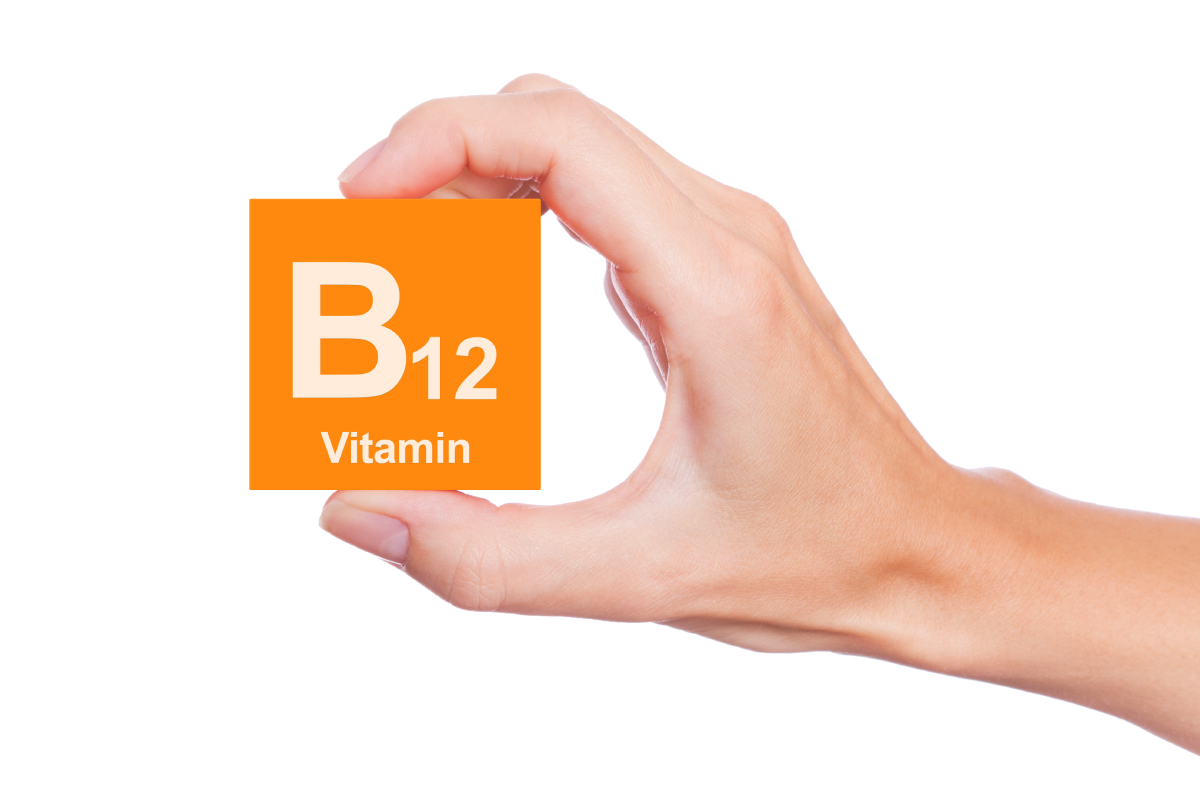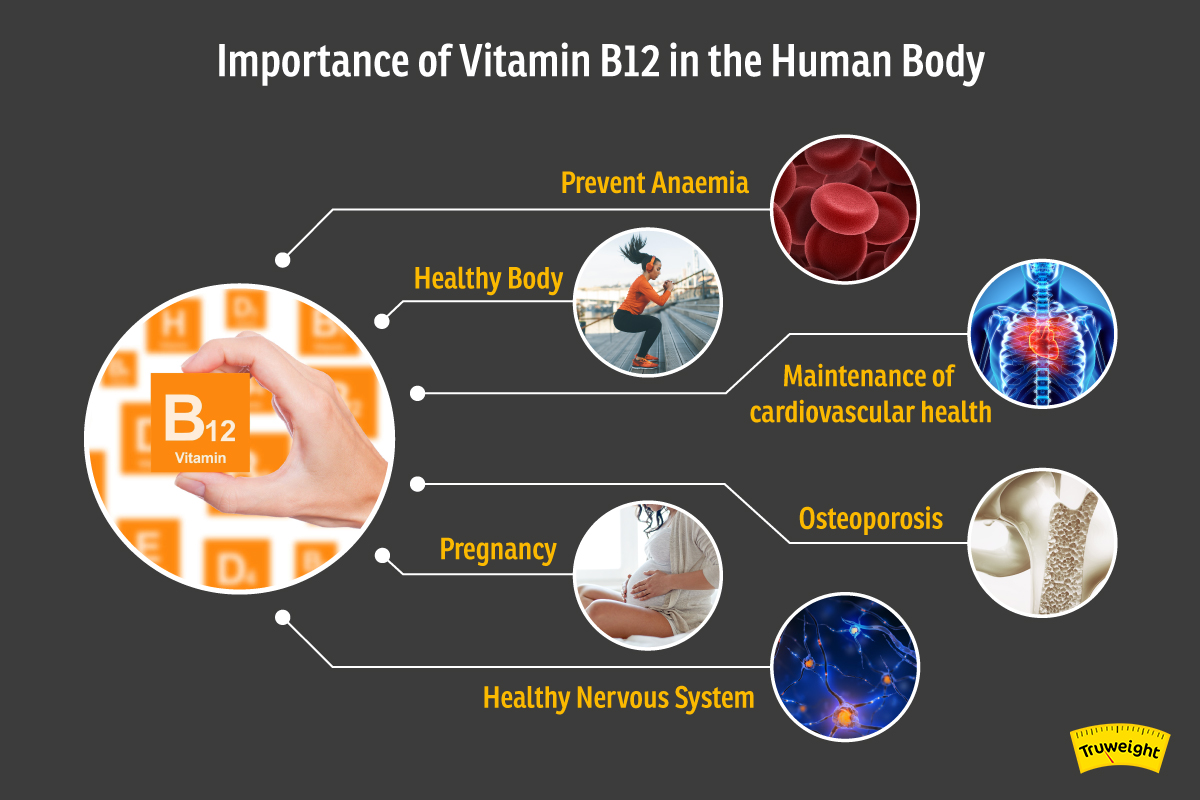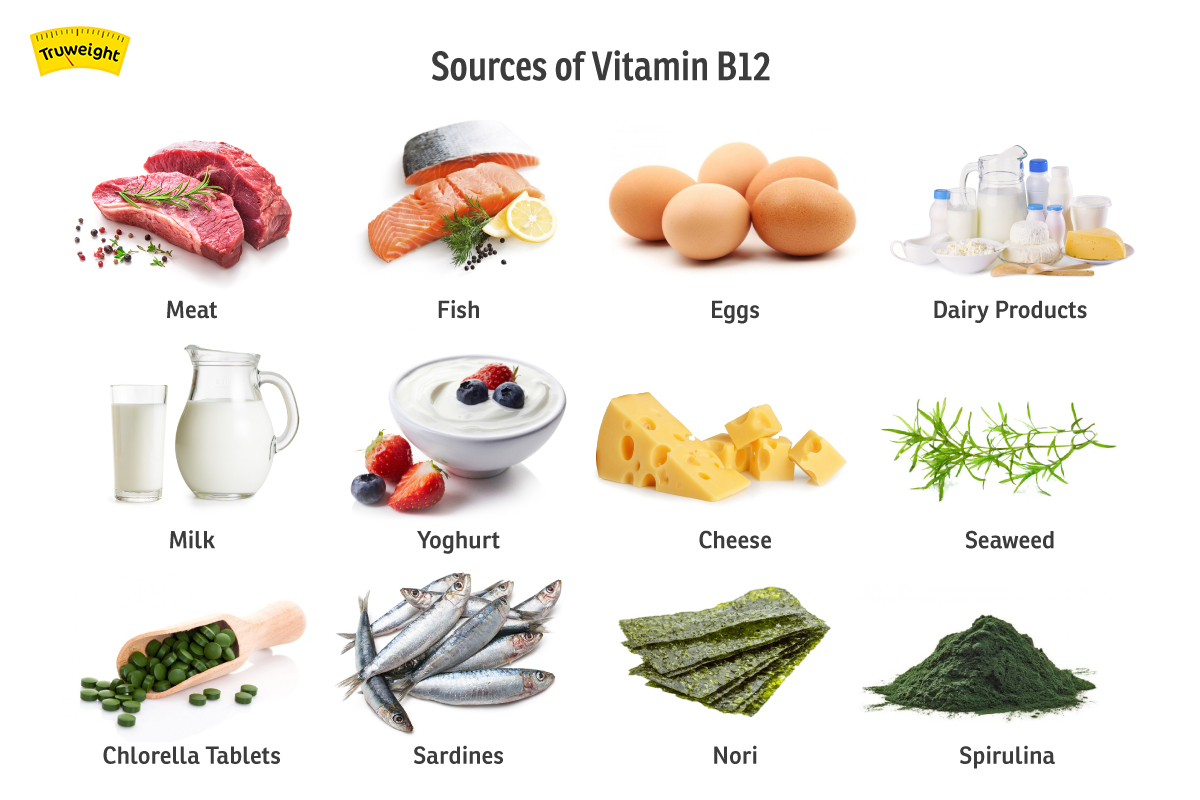food, Food & Nutrition, Health, Lifestyle, Nutrition
Vitamin B12: A Key Player In Keeping The Body Healthy
Medically reviewed by Dr. Shunmukha Priya, Ph.D. in Food Science and Nutrition
The B12 Vitamin, also known as Cyanocobalamin, is a water-soluble vitamin that nourishes the body’s nerve and blood cells and helps in making of the DNA, the genetic material present in all cells.
B12 also prevents a type of anaemia called the Megaloblastic anaemia that brings in fatigue and weakness and difficulty in concentrating.
Table of content
- Importance of Vitamin B12
- Symptoms of B12 deficiency
- Reasons behind the deficiency
- Effects of inadequate B12
- Deficiency in older patients
- Treatment and Management
- Reverse neuropathy
- Conclusion
B12 is a unique vitamin which cannot be produced by the body itself. It can be found naturally in foods that are of animal origin and fortified plant foods with added B12.
A glycoprotein is produced by parietal cells in the stomach is necessary for the absorption of vitamin B12. After absorption, B12 is utilised as a cofactor for enzymes that are used in the synthesis of fatty acids, DNA, and myelin.

A deficiency of vitamin B12 leads to hematologic and neurologic symptoms. Excess B12 is stored in the liver.
However, in cases of malabsorption of B12 for a prolonged period, for reasons such as dietary insufficiency, lack of intrinsic factor etc leads to B12 deficiency. This can be resolved by improving diets and/or by taking oral supplements.
One cannot overdose on B12 as any excess amount of the vitamin sheds away through the urinary tract. The only known side effect of too much B12 consumption is acne, which is also very rare.[1]
Role of Vitamin B12 in the human body
Vitamin B12 plays a vital role in keeping the body healthy. Here are some of the important functions of B12.
1. Red Blood cell formation and fighting Anaemia
B12 is essential for the formation of red blood cells. It nourishes the cells and makes them look healthier, with small and round in sizes.
A deficiency of vitamin B12 might cause these RBCs to swell up and acquire an irregular shape. This shape creates difficulty in free movement of the blood; hence the person suffers from anaemia.
A proper dose of vitamin B12 in the body saves the person from energy loss, feeling of fatigue and tiredness.[2]
2. Pregnancy
In the 29th issue of a research article published on Sage journal titled Effects of Folate and Vitamin B12 Deficiencies During Pregnancy on Foetal, Infant, and Child Development, the authors highlighted that the critical reason behind maternal morbidity is the low folate status during pregnancy and lactation.
Improper amount of folate during pregnancy leads to low infant birth weight, therefore inviting the risk of developmental issues and long-term adverse health outcomes.
Folate related anaemia during childhood and adolescence might expose children to infections and diseases. The importance of folic acid in the prevention of Neural Tube Defects (NTD) has been long established. Multiple studies have hinted that folic acid can prevent other birth defects as well.
The deficiency of clinical vitamin B12 might be a reason behind recurrent spontaneous abortion or infertility in mothers.

Deficiency of B12 during pregnancy increases the risk of birth defects and may contribute to preterm delivery. Furthermore, inadequate amounts of B12 in the mother can lead to a significant deficiency in the infant.
If sufficient amounts of B12 are not supplied during pregnancy or through breast milk, the child might develop B12 deficiency.[3]
3. Osteoporosis
Vitamin B12 is concerned with osteoblast (a cell that develops bone) activity and bone formation. A study conducted by the American Society for Bone and Mineral Research (ASBMR) connected the deficiency of vitamin B12 to low bone density.
Even after adjusting and interchanging various factors like age, BMI, height, smoking and/or alcohol consumption, gender etc., Vitamin B12 still remained a significant factor in the process of bone metabolism.
A deficiency of B12 results in low levels of bone-forming elements. People develop porous bones that are weak and prone to fracture. This low bone density generally targets men at hips and women at the spine. Therefore, Vitamin B12 is vital for healthy and strong bones.
4. Healthy Nervous System
Folic Acid and Vitamin B12 play major roles in the prevention of neuropsychiatric disorders such as mood disorders, dementia etc, and the damaging of nerves and spinal cord.
Children who lacked Vitamin B12 in their growing years tend to be depressed in adulthood. A journal published by the Bristol eye hospital suggested that even a mild deficiency of B12 renders the retina and optic nerve unduly sensitive to tobacco.
5. Healthy looking body
Deficiency of Vitamin B12 in the body calls for various dermatological symptoms, including nail discolouration, hyperpigmentation, vitiligo (loss of skin colour in areas), hair changes, and angular stomatitis (cracked and inflamed mouth).
Adequate levels of Vitamin B12 in the body will keep the hair, skin and nails healthy and well-nourished.
6. Maintenance of cardiovascular health
A research paper from the American Journal of Preventive Medicine (AJPM) has suggested the relation of deficiency of B12 and the risk of cardiovascular diseases. Vegetarians are at a greater risk of heart diseases.
Deficiency of B12 is associated with a variety of atherogenic processes that are mainly due to hyperhomocysteinemia, a product of B12 deficiency.
Macrocytosis (presence of large blood cells in the blood), related to the deficiency of B12, is also related to non-fatal and fatal coronary disease, stroke, myocardial infarction, and other cardiovascular issues.
Vegetarians are mostly deficient in Vitamin B12 when compared with their non-vegetarian counterparts. They are also at high risk of developing side effects due to medications since their B12 status is poor.
A vegetarian diet majorly lacks B12, and this deficiency might negate the cardiovascular disease prevention benefits of vegetarian diets. Vegetarians, therefore, are highly required to orally take B12 supplements along with a complete diet.[4]
Symptoms of a B12 deficiency
Some of the classic symptoms of Vitamin B12 deficiency include:
- Tingling and/or itchy tongue
- White spots on the skin
- Sharp stabbing and/or tingling pain in one or both hands
- Smooth glossy tongue, the disappearance of tiny bumps on the tongue
- Brain fog
- Heart palpitations
- Pales skin
- Digestive Woes (loss of appetite, constipation)
- Chilly sensations
- The feeling of numbness and general cold
- Disturbed vision
- Breathlessness and/or dizziness
- Mood changes (mainly increased irritability)
- Fatigue
The risk factors for Vitamin B12 deficiency are:
- Decreased ileal absorption
- Crohn disease
- Ileal resection
- Tapeworm infection
- Decreased intrinsic factor
- Atrophic gastritis
- Pernicious anaemia
- Postgastrectomy syndrome (includes Roux-en-Y gastric bypass)
- Transcobalamin II deficiency
Some of the other factors that can lead to Vitamin B12 deficiency include,
- Genetic factor
- Inadequate intake of Vitamin B12
- Alcohol abuse
- Patients older than 75 years
- Vegans or strict vegetarians (including exclusively breastfed infants of vegetarian/vegan mothers)
Reasons behind the deficiency of B12
- Autoimmune: In a condition of Pernicious Anaemia, antibodies for vitamin B12 are produced. This hinders the body from absorbing Vitamin B12.
- Malabsorption: Production of vitamin B12 takes place in the parietal cells of the stomach. Therefore, any damage to the terminal ileum (a segment of the small intestine), or appearance of a new alimentary pathway through gastric surgeries which bypass the site of vitamin B12 production, will lead to a deficiency of B12. Other damages to the small intestine, such as inflammation from diseases or infections may also result in impairment in B12 production.
- Dietary Insufficiency: Although B12 is stored in excess in the liver, it starts to deplete when the person follows a strict vegan diet for three years or more and therefore creates deficiency.
- Ageing: With an increase in age, plasma vitamin B12 starts to decrease while the Serum Methylmalonic Acid (MMA) tends to concentrate. These changes bring about a deficiency of B12. The reasons for this decline are a decrease in gastric acidity, the presence of atrophic gastritis bacterial overgrowth accompanied by food-bound B12 malabsorption, distorted structures of the B12 binding proteins and a lack of liver stores.
- Smoking: A study conducted by John DC Linell in Norwegian Institute of Nature Research concluded that smoking disturbs the metabolism of B12 and increases the urinary excretion.
- Genetic Defects: Individuals with genetic defects that include deletions or defects of enzymes in the pathway of Cobalamin experience a deficiency of B12.
- Nutrient-Nutrient Interactions: Many nutrients like Vitamin C don’t sit well with B12. Individuals with an overdose of Vitamin C and other such nutrients were found to be deficient in B12.
- Contraceptives: Studies show that pills that contain a high level of oestrogen, mainly the birth-control pills, are strongly the reason behind the impaired absorption of vitamin B12. Women who have been taking contraceptives for extended periods of time often develop a deficiency of B12. [5]
- Medications: A multicenter randomised controlled trial of 390 patients with diabetes mellitus showed that intake of 850 mg of metformin three times per day had an increased risk of vitamin B12 deficiency and low vitamin B12 levels vs. placebo.
Effects of inadequate consumption of Vitamin B12
- Neurological Effects: A deficiency of vitamin B12 brings in the risks of sensory disturbances like tingling and numbness, especially in the lower limbs. Vibratory and position sense are primarily affected. There are chances of motor disturbances and cognitive changes such as a loss of concentration and low memory retention, disorientation and frequent dementia. There are chances of developing visual disturbances, insomnia, impotence and impaired bladder control in rare cases.
- Haematological Effects: The most apparent effect of B12 deficiency is pernicious anaemia. It affects the patient’s body in several ways, and one will experience diminished energy, fatigue, shortness of breath and palpitations.
- Gastrointestinal Effects: There are underlying gastric troubles in Pernicious Anaemia, therefore, a deficiency of B12 might lead to the sore tongue, loss of appetite, flatulence and constipation.
How to get Vitamin B12?

Vitamin B12 deficiency in older patients
A 2004 issue of the Canadian Medical Association Journal gave a detailed insight into the deficiency of Vitamin B12 in elderly patients.
The symptoms of deficiency are subtle and potentially dangerous, particularly from a neuropsychiatric perspective. 20% of the general population of the industrialised countries are affected by B12 deficiency.
A cause behind this deficiency in patients is the food malabsorption. The deficiency is usually treated by giving Vitamin B12 shots (injection) to the patients.
The deficiency of B12 plays a significant role in the development of Alzheimer’s disease and vascular dementia in elderly people, sometimes Parkinson’s.
Treatment and Management
B12 deficiency is pretty common and treatable. It involves repletion of B12 through oral supplements or dietary improvements in cases of patients following a strict vegan diet.
Vitamin B12 injections are given to patients who experience the deficiency due to pernicious anaemia or gastric bypass surgery since the oral supplements will not be absorbed.
Patients who are suffering from Crohn’s disease or Celiac disease are at risk of developing Vitamin B12 deficiency. Their B12 status should be routinely monitoring.
As per ICMR RDA (2010) for Indians, the recommended dietary amounts of Vitamin B12 are as follows:
| 14 Years or Older | 2.4 micrograms daily |
| Pregnant Women | 2.6 micrograms daily |
| Breastfeeding Women | 2.8 micrograms daily |
People over the age of 50 should try to get their recommended dietary amounts by eating foods with B12 or by taking supplements containing 25 to 100 mcg of B12.
Reverse neuropathy on Vitamin B12
Vitamin B12 plays a significant function in the smooth running of the neurological system and its deficiency can cause various neuropsychiatric disorders.
Patients with acute disorders such as dementia respond dramatically to Vitamin B12 injections. Progression of neuropathy has been frozen in most cases, but the neurological abnormalities still persist.
Conclusion
Vitamin B12 is not produced in the body; therefore a person depends on external intakes of the same.
It maintains healthy RBCs, a fit nervous system and prevention of anaemia, chronic diseases and Neural Tube Defects (NTB). B12 synthesizes citric acid cycle intermediate and is vital to folate metabolism.
Absorption of B12 significantly decreases after the age of 60. Hence, close monitoring should be exercised to curb the deficiency at the soonest.
If you are a vegetarian, eat dairy products regularly to keep ensure adequate Vitamin B12.
Likewise, if you are a vegan, monitor your Vitamin B12 levels often and talk to your doctor for supplements if needed. Most importantly, eat a well-balanced diet that offers the necessary nutrients.
Remember food is your medicine and eating right can prevent most of the lifestyle-related diseases. Happy and healthy eating!
Other Reference:
- Journal Article Lancet 1958 Vol.2 pp.286-290
- An article titled Vitamin B12 Deficiency (Cobalamin) by Alex Ankar and Anil Kumar
- Effects of Smoking on Metabolism and Excretion of Vitamin B12 by John DC Linell, 1968
- Dietary Reference Intakes for Thiamin, Riboflavin, Niacin, Vitamin B6, Folate, Vitamin B12, Pantothenic Acid, Biotin, and Choline.
- The case report presented by Umm Al-Qura University, Makkah in association with Soliman Fakeeh Hospital, Jeddah, Saudi Arabia.
FAQs
Q: What is vitamin b12 good for?
A: Vitamin B12 is good for overall health. It prevents anaemia, cardiovascular diseases, keeps the bone and nervous system healthy.
Q: Which foods are high in b12?
A: Meat-based foods are a good source of vitamin B12.
Q: Can low b12 cause weight gain?
A: No, low Vitamin B12 will not cause weight gain.
Q: Does b12 improve skin?
A: Vitamin B12 is important for healthy skin.
Q: What are the side effects of taking vitamin b12 in excess?
A: In rare cases, excess of vitamin B12 can cause headache, vomiting, anxiety, nausea and dizziness.
Q: How do you know if you need vitamin b12?
A: When you experience fatigue, stabbing pain in hands, heart palpitations, blurred vision etc, then it is a sign that you need to check your vitamin b12 levels.
